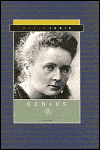Through the Looking Glass Children's Book Reviews
Genius: Marie Curie
Nonfiction
For ages 10 to 14
The Creative Company, 2006 ISBN: 978-1583413326
From the beginning Manya was a very determined and stubborn person who would not let others make decisions for her. When she was a little girl her country, Poland, was ruled over by Russia. The Russian occupiers made it very difficult for the Poles to hold onto their Polish identity, making it illegal to speak the Polish language and to teach Polish history in the schools. If you wanted to be a Pole you had to do so behind closed doors and behind the backs of Russian soldiers and officials. Manya did all of this, refusing to allow the Russians to deprive her of her cultural heritage.
As a young adult Manya very much wanted to get out of Poland so that she could continue her studies in a free society. The family had little money however so Manya and her sister Bronia made a deal. First Manya would pay for Bronia’s education in Paris and then Bronia would do the same for Manya. Manya had to wait a long time before it was her turn but at last, in 1891, she left to take up her studies at the Sorbonne in Paris. It was at this time that she began to call herself Marie.
Though Marie was brilliant and clearly more than able to do the work, she had an uphill struggle to convince her teachers and colleagues that a woman could indeed be a scientist. Even after getting degrees in physics and mathematics, there were many who did not feel that a woman’s ‘inferior’ mind was up to being a scientist. Marie worked hard to prove them wrong and she opened a door for other women scientists who came after her.
Working under very difficult conditions Marie proved without a doubt that women are perfectly capable of making scientific discoveries. She discovered two elements, Polonium and Radium, and she won two Nobel Prizes for her work, something no one had done before. Always hard up for money, often sick, and frequently the victim of discrimination, Marie never gave up and in the end she launched a whole new field of scientific research.
This biography is not only superbly written, but it is also pleasing to the eye with its excellent presentation. With quotations on every page and full of beautiful annotated period photographs this volume serves as a fitting tribute to a very special woman. At the back of the book the author has included a section called “In her Words.” Here readers can read what Marie Curie wrote about on a variety of topics.
This is one of the titles in the “Genius” series.




